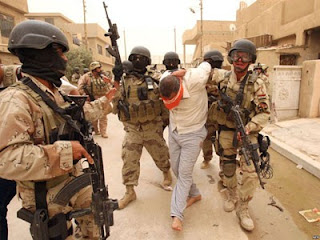For the last several weeks the Iraqi security forces (ISF)
have carried out a number of operations in Anbar, especially in the western
desert and along the Euphrates River. This hasn’t seemed to stop the violence
however. In fact, as a sign of defiance Al Qaeda in Iraq recently announced an
offensive of its own in the province. The situation has gotten so bad that
local officials have told the press that the military and police have lost
control of the border area, and that fighters are going back and forth between
Syria and Iraq at will. This is just the latest example of the ineffectiveness
of the army and police in combating the country’s insurgency.
 |
| (Institute for the Study of War) |
The Iraqi security forces have announced operation after
operation in Anbar to no apparent affect (Al-Mada)
In response to the country’s deteriorating security
situation, the government has launched one security crackdown after another in
Anbar. On May 16, the government announced The Ghost that was aimed at clearing
out Al Qaeda in Iraq (AQI) camps in the desert region of the governorate. On
May 28, the Defense Ministry said it was beginning another operation against
AQI across Anbar, Ninewa, Diyala, Salahaddin, Babil, and Baghdad. At the
beginning of June, the government sent the army to the Syrian and Jordanian border in Anbar. This was in preparation for the delayed elections that
were taking place on June 20. Those forces stayed after the vote, and began another strike under the Anbar Operations Command in the Rawa district by the Syrian
border after a clash with militants that killed two soldiers. This covered the Rawa area, the western Sahara, and the town of Nukhayb. None of these
operations appeared effective, and were widely criticized by Anbaris. The
deputy head of the provincial council Sadoun Abdi Shalan said that the security
forces were only out in the field for 1-2 days, then they would withdraw, and
militants would move right back in. An anonymous official told Al-Mada that the ISF had failed at stopping infiltrations across the Syrian border, and that
they were completely unequipped for the task. The source claimed that the
Iraqi army only had two helicopters to monitor the entire border area, and only
one was active at a time. This came on top of the complaints about arbitrary
arrests, closing down traffic between cities, and the destruction of property. These tactics have proven to be failures. They were exactly the same type
used by the United States before the 2007 Surge, and everyone knows how that
turned out. Raiding without holding ground can only temporarily disrupt
insurgents, and the abuses that come along with the operations only create
resentment amongst the populace against the security forces and government.
There have been complaints about arbitrary arrests by the
security forces in Anbar (Al-Mada)
To show how ineffective the ISF were Al Qaeda not only
maintained its attacks, but also announced an offensive of its own. On June 24,
AQI let it be known that it was launching a new campaign in Anbar that included
the cities of Hit, Rawa, and Qaim. The next day, the deputy council head
Shalan told New Sabah that there was a large increase in violence with attacks
upon both civilians and the security forces. In mid-June for instance, a
military barracks outside of Rawa was attacked for several hours, which only
ended after helicopters showed up. Back in May, Al Qaeda also told the press
that it was talking to tribal leaders in the province to win them to their
side. AQI has proven to be not only resilient, but also capable of a resurgence.
Last year, the group was only able to carry out a high level of operations for
a few months, and then had to regroup and resupply. Now it has been carrying
out a wave of bombings for the last seven months starting in December 2012. There
are several factors that help explain this. First, it is benefiting from the
civil war next door in Syria, which allows it to freely move across the border
to gain equipment, fighters, and funds. Second, it has capitalized upon the
government’s huge mistake to attack the demonstrators in Hawija, which pushed
large sections of the protest movement and tribes towards violence to express
their frustration. The Islamists have exploited these feelings of alienation to
grow its franchise as shown in its attacks in Anbar.
Anbar was the birthplace of the insurgency in Iraq, and now
it is having a rebirth. Al Qaeda in Iraq is in the lead in this resurrection.
The government’s security campaigns have been unable to curtail the militants.
Ironically, the security forces are actually making the situation worse with
their heavy-handed tactics. That’s leading Anbar back to exactly where it was
in 2003-2004 with increasing violence, tribes deciding on whether they want to
support militants or not, and spreading instability. There appears to be no
reversing this situation for now, which means Anbar will only slip further into
chaos for the time being.
SOURCES
AIN, “IA continues operations in Anbar to chase Qaeda
elements,” 6/14/13
- “Military operation to track down gunmen launched in
Anbar,” 6/22/13
Al-Mada, “Al Qaeda announces the launch of the “New Battle”
for western Anbar and police decide on comprehensive curfew,” 6/24/13
- “Sources: Fighters infiltrating Anbar and the army has
only two helicopters to protect the border,” 6/24/13
Al Nuaimi, Ahmed, “”Anbar” demanding perpetuation of
military operations in desert,” New Sabah, 6/25/13
Al-Qaisi, Mohammed, “Iraqi forces launch operation in
response to recent attacks,” Al-Shorfa, 5/31/13
Sadah, Ali Abel, “Iraq Moves Troops To Syrian Border,”
Al-Monitor, 6/18/13
- “Al-Qaeda-Iraq Statement A Sign Of Rising Sectarian
Violence,” Al-Monitor, 5/31/13
Al-Shamar, Salah, “Iraq masses troops on border with Syria
to guard elections in two provinces,” Azzaman, 6/16/13







No comments:
Post a Comment